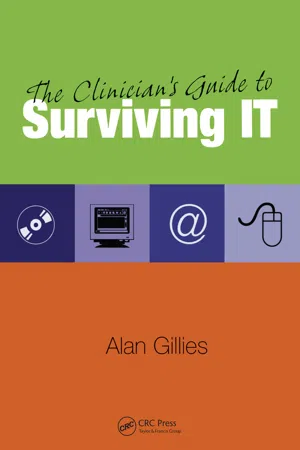
- 160 pages
- English
- ePUB (mobile friendly)
- Available on iOS & Android
eBook - ePub
The Clinician's Guide to Surviving IT
About this book
The NHS is currently in the middle of the biggest information technology project in Western Europe, which will fundamentally change the working practices of all NHS staff over the next five years. This book explains to ordinary clinicians why they should be bothered with IT, and what their responsibilities are in making it work. This book provides an enlightening and reassuring read that dispels ignorance and suspicion. The user friendly style is helpful, and friendly panels with tips, warnings, reflective pauses and key points highlight important details. It is also suitable for use as a student textbook. The Clinician's Guide to Surviving I.T. is a must for every doctor, nurse and midwife in the NHS.
Tools to learn more effectively

Saving Books

Keyword Search

Annotating Text

Listen to it instead
Information
Part I
What can informatics do for me?
1
Informatics is important, honest
Why should we care about informatics?
There are people who believe that we should care about IT because it is IT, and therefore it is wonderful. They generally wear anoraks, collect locomotive numbers and talk fluent Hungarian. For the rest of us, we care about things that make our lives better, easier or occasionally – just more fun.
Tip: Informatics and IT

IT stands for information technology. In this book we shall use the term ‘informatics’ a lot instead. Health informatics, the application of IT within healthcare, has been defined as:
‘The knowledge, skills and tools which enable information to be collected, managed, used and shared to support the delivery of healthcare and to promote health’.
In other words, it’s not just about computers!
For many people, their experience with trying to use information within the health sector has been one of frustration, and can be summed up in the following (bad) joke:
Smile!

I say, I say, I say, why do clinical staff think health information systems are like elephants?
I don’t know. Why do clinical staff think health information systems are like elephants?
Because you feed lots of stuff in, most of it gets lost in its gizzards, and generally what comes out is a pile of dung . . .
However, it doesn’t have to be like this. Informatics has the potential to help us do many desirable things:
- provide accurate information at the point where it is needed
- remove the need to keep recording the same data again and again and again
- facilitate joined-up care
- help clinicians and patients make better decisions
- eliminate transcription errors
- improve decision making
- manage a patient journey to reduce delays.
In the past, enthusiasts have tended to create the impression that these things will happen without effort, and the benefits of the technology have been rather oversold. On the other hand, information technology is in widespread use already in the NHS.
Pause for thought

What percentage of prescriptions in primary care are issued with the help of computer systems and the protection that is offered through decision support?
- <25%
- 25–50%
- 51–89%
- >90%
The answer to this question is > 90%. It is a routine part of primary care.
In reality, IT brings no benefit by itself.
Smile!

You knew that, didn’t you?
This could be a very short book, but please let me finish this point.
The benefits accrue from working in different ways facilitated by the technology. This means that you will have to change the ways in which you work. That’s the bad news. The good news is that through that change, you will get to a better place.
Pause for thought

‘An educated workforce is liberated by new technology; an ill-educated workforce is enslaved by if.
It’s your choice!
Smile!

Or if that’s a bit heavy, remember Winnie-the-Pooh:
‘Here is Edward Bear, coming downstairs now, bump, bump, bump, on the back of his head, behind Christopher Robin.
It is, as far as he knows, the only way of coming downstairs, but sometimes he feels that there really is another way, if only he could stop bumping for a moment and think of it’.
Winnie-the-Pooh, AA Milne
Why do our leaders care about informatics?
Our leaders may have a rather different agenda. All first-world national healthcare systems face a range of challenges:
- ageing population which may increase healthcare needs
- reduced working population generating income to pay for health and care systems
- increasingly sophisticated health technology, which is generally more expensive
- people living longer, so consuming healthcare resources for longer.
Traditionally, healthcare expenditure is calculated as the percentage of the national wealth, measured as gross national product (GNP). Considered in this way, healthcare costs are rising all over the world.
Faced with such challenges, governments are seeking ways to ensure that their healthcare system remains economically viable. In the UK, the Treasury commissioned a report from Derek Wanless, an economist, on the future sustainability of the NHS.
Tip: Finding information

Like many government reports and documents, the Wanless reports (there are two!) are available on the World Wide Web.
If you don’t know how to find them, try my virtual library at www.healthlibrary.org.uk and look for the NHS policy documents section.
Mr Wanless reported that the NHS would be viable, provided that it worked smarter (although it took him a lot of words to reach this conclusion!).
The Review’s projections incorporate a doubling of spending on ICT to fund ambitious targets of the kind set out in the NHS Information Strategy. To avoid duplication of effort and resources and to ensure that the benefits of ICT integration across health and social services are achieved, the Review recommends that stringent standards should be set from the centre to ensure that systems across the UK are fully compatible with each other.
The Review recommends that a more effective partnership between health professionals and the public should be facilitated, for example, by:
- development of improved health information to help people engage with their care in an informed way.
Source. Wanless, 2002
So, the government sees IT as a way of enabling the NHS to work smarter by:
- reducing waste
- reducing duplication of effort
- reducing staff
- replacing expensive roles with cheaper roles plus decision support
- reducing adverse events.
Frankly, you may or may not believe that this is true. What it means for clinicians is that the government is pouring money into IT in the NHS. This creates opportunities for you to use it for improving your own situation, irrespective of anyone else’s agenda.
Pause for thought

One of the really positive aspects of the use of IT in the NHS is the potential to achieve health and economic goals at the same time. For example:
- increasing immunisation rates
- reducing prescribing errors
- managing conditions in primary care and preventing secondary admissions
can all be facilitated by proper use of IT and provide better care and save money.
Does it really work?
So it can work, but does it work? We are still in reality in the early stages of making good use of IT in the health sector, but already th...
Table of contents
- Cover
- Title Page
- Copyright Page
- Foreword
- Preface
- Part I: What can informatics do for me?
- 1 Informatics is important, honest
- 2 Informatics can improve patient care
- 3 Informatics can help with professional practice and development
- 4 Informatics can facilitate integrated care
- 5 Informatics can empower patients
- Part II: What do I need to do for informatics?
- 6 Be professional
- 7 Data standards
- 8 Keep information safe
- 9 Involve the patients in decision making
- 10 Conclusions
- References
- Bibliography
- Index
Frequently asked questions
Yes, you can cancel anytime from the Subscription tab in your account settings on the Perlego website. Your subscription will stay active until the end of your current billing period. Learn how to cancel your subscription
No, books cannot be downloaded as external files, such as PDFs, for use outside of Perlego. However, you can download books within the Perlego app for offline reading on mobile or tablet. Learn how to download books offline
Perlego offers two plans: Essential and Complete
- Essential is ideal for learners and professionals who enjoy exploring a wide range of subjects. Access the Essential Library with 800,000+ trusted titles and best-sellers across business, personal growth, and the humanities. Includes unlimited reading time and Standard Read Aloud voice.
- Complete: Perfect for advanced learners and researchers needing full, unrestricted access. Unlock 1.4M+ books across hundreds of subjects, including academic and specialized titles. The Complete Plan also includes advanced features like Premium Read Aloud and Research Assistant.
We are an online textbook subscription service, where you can get access to an entire online library for less than the price of a single book per month. With over 1 million books across 990+ topics, we’ve got you covered! Learn about our mission
Look out for the read-aloud symbol on your next book to see if you can listen to it. The read-aloud tool reads text aloud for you, highlighting the text as it is being read. You can pause it, speed it up and slow it down. Learn more about Read Aloud
Yes! You can use the Perlego app on both iOS and Android devices to read anytime, anywhere — even offline. Perfect for commutes or when you’re on the go.
Please note we cannot support devices running on iOS 13 and Android 7 or earlier. Learn more about using the app
Please note we cannot support devices running on iOS 13 and Android 7 or earlier. Learn more about using the app
Yes, you can access The Clinician's Guide to Surviving IT by Alan Gillies in PDF and/or ePUB format, as well as other popular books in Medicine & Public Health, Administration & Care. We have over one million books available in our catalogue for you to explore.